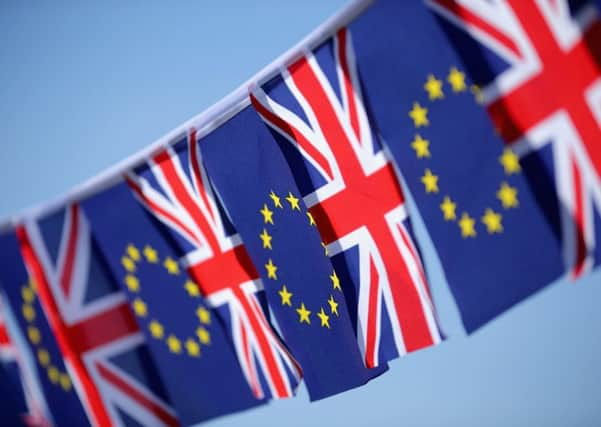Joyce McMillan: need for unity among those against Brexit


It is already an open secret that the sheer complexity of this task has left British government departments floundering, with no clearer idea of how to proceed than they had 13 months ago, on the morning after the Brexit vote. And with many Westminster politicians and Whitehall grandees still struggling fully to recognise the profound constitutional changes introduced in the UK by the first Blair government, 20 years ago, it’s perhaps not surprising that within hours of the release of the bill, the First Ministers of Scotland and Wales had issued a strongly-worded joint statement pointing out that the bill as currently drafted offers none of the promised new powers to the devolved parliament and assembly, and instead reduces their powers in relation to devolved areas now being repatriated from Europe to Westminster; they called the bill “a naked power-grab, and an attack on the founding principles of devolution”.
Like many recent protests against the conduct of the Brexit process, though, this powerful statement from Nicola Sturgeon and Carwyn Jones leaves us none the wiser about exactly what is to become of us, as our more or less rudderless Brexit ship ploughs on through unknown waters. Over the past few weeks, an apparently endless list of organisations and individuals in British public and business life – including the CBI, the Institute of Directors, the insurance industry, the finance and aviation sectors, many citizens’ and human rights organisations, the current boss of Sainsbury’s, the head of the National Audit Office, and former Scottish Conservative MEP Struan Stevenson – have issued their own statements pointing out the apparent disarray of the UK government’s approach. Most beg the government either to negotiate urgent transitional deals that will involve very little change, or to halt the process altogether. And there is some evidence that if the Brexit question were to be put to the British people again, the answer might now be different; more like a 52 per cent-48 per cent vote to remain in the EU, rather than the reverse.
Advertisement
Hide AdAdvertisement
Hide AdYet for all the sense of a mounting tide of dismay over the sheer difficulty of Brexit and its consequences, there is still not even the detectable outline of a political movement that might begin to halt it; mainly because of the sheer danger and difficulty, in a democracy, of setting aside a decision so clearly if narrowly made by the people of the UK, just 13 months ago. Sturgeon and the Scottish Government, for example – with a clear 62 per cent Remain mandate in Scotland – have taken the clearest anti-Brexit position from the outset, and have also put in the most detailed work on alternatives that might minimise its economic impact; but they are weakened by their recent loss of electoral support on other matters.
Their alliance with Jones’s Labour administration in Cardiff is impressive, given that it crosses one of the most acrimonious party divides in British politics; but it is likely to be ignored not only by the Tory government, but also by Jeremy Corbyn’s Labour Party, which – despite it avowed radicalism – seems to suffer exactly the same problem in recognising the existence of devolved politics as the rest of the Westminster establishment.
The Labour Party itself is the very microcosm of Britain’s current confusion over Brexit: committed to respecting the referendum outcome, but under increasing pressure to oppose every disastrous detail of its actual implementation. There are plenty of business-friendly Tories appalled by the whole spectre of Brexit, but none so far willing to say that the great British people have made a historic error, and should be given a chance to change their minds. And as for the Liberal Democrats – well, like the SNP, they stand mildly humiliated by the truth that while 48 per cent of voters chose to Remain, most of them, as yet, seem not to care enough about it to refrain from voting for parties which are committed to the Brexit process.
It feels, in other words, as if there are dozens of heavy freight-cars rolling around loose in the stockyard of anti-Brexit politics; but with absolutely no obvious sign of an engine, or an engine-driver, capable of forming them into a train, and moving them forward. There are various triggers that might provoke a decisive shift in opinion, either at Westminster or in the country; they range from retrospective ones, such as a serious legal challenge to the conduct and funding of last year’s campaign, to purely political ones, like the formation of a serious cross-party Halt Brexit campaign, the emergence of a noisy UK-wide youth movement demanding that its pro-Remain voice be heard, or – in Scotland and Wales – a new and emphatic swing of public opinion behind the devolved administrations, as they seek to pursue “soft Brexit” options, and defend their own powers.
For the moment, though – thanks to the damage suffered by the SNP in last month’s election, and the Old Labour constitutional attitudes enshrined in Corbyn’s opposition leadership – Prime Minister Theresa May can reassure herself that if she plays a weak hand in Brussels, she is currently playing a strong one when it comes to British constitutional politics. And that means that we are all about to receive a crash course it what it means to belong to a state with no written constitution and an entirely sovereign parliament, elected by the least proportional of voting systems, at the moment when it is unleashed from the norms and constraints of EU membership; and is free to reverse, tear up, deride and dismiss not only much of the regulatory structure we have come to take for granted since the 1970s, but also all the hard-won constitutional advances of the last 40 years – or at least, everything about them that the people, at the ballot box or elsewhere, do not care enough to defend.